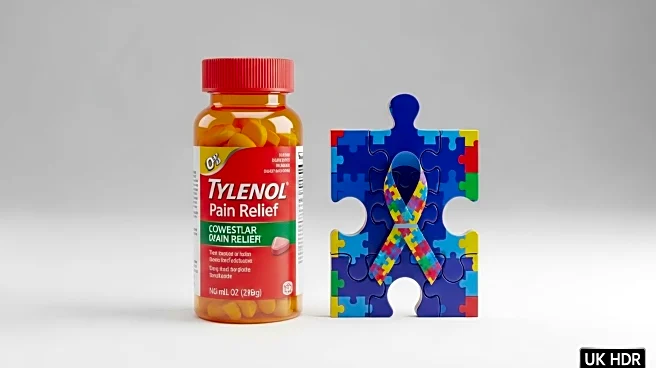What's Happening?
President Trump has sparked controversy by suggesting a link between the use of Tylenol during pregnancy and autism, a claim that has been widely discredited by scientific research. During a White House briefing, Trump stated that acetaminophen, sold under the brand name Tylenol, may be linked to higher autism rates in the United States. He advised pregnant women to avoid acetaminophen, claiming it is 'very dangerous to the woman's health,' despite the lack of evidence supporting this claim. Trump's remarks have drawn criticism from medical professionals and organizations, including the National Autistic Taskforce, which expressed concern over the perpetuation of myths about autism and the potential impact on public health decisions.
Why It's Important?
Trump's statements could have significant implications for public health, as acetaminophen is the most commonly recommended pain reliever during pregnancy. The claims may discourage pregnant women from using acetaminophen, potentially leading to increased use of alternative medications that may pose greater risks. The controversy also highlights the ongoing challenges in dispelling misconceptions about autism spectrum disorder, which affects 1 in 31 U.S. children according to the CDC. The remarks could influence public perception and policy decisions, reinforcing harmful stereotypes and undermining efforts to support autistic individuals.
What's Next?
In response to Trump's remarks, the FDA has advised clinicians to consider minimizing acetaminophen use during pregnancy for routine low-grade fevers, although no causal link has been established. The administration plans to formally recognize leucovorin, a drug used in cancer therapies, as a potential treatment for autism, despite the need for larger studies to confirm its efficacy. The controversy may lead to increased scrutiny of health claims made by political leaders and calls for more rigorous scientific research to guide public health recommendations.
Beyond the Headlines
The situation underscores the ethical responsibility of public figures to base health recommendations on scientific evidence. It raises concerns about the influence of misinformation on public health policy and the potential consequences for vulnerable populations. The debate also highlights the need for greater support and advocacy for autistic individuals, focusing on their contributions to society rather than perpetuating myths about the causes of autism. The role of government agencies in providing accurate information and making science-informed decisions is crucial in maintaining public trust and ensuring the well-being of citizens.










